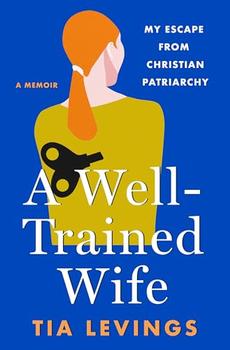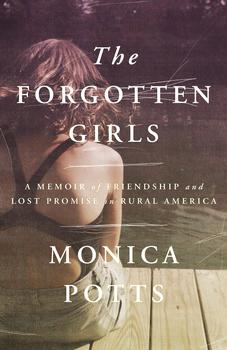Summary | Excerpt | Reading Guide | Reviews | Beyond the book | Read-Alikes | Genres & Themes | Author Bio

My Escape from Christian Patriarchy
by Tia LevingsThis harrowing and beautifully written memoir explores the author's journey into—and eventual escape from—fundamentalist Christianity. It recounts how extreme patriarchal theology enabled her abusive husband's violence against her, and how changing her beliefs empowered her to leave her marriage. The vivid narration immerses the reader into her headspace at each point in time. We see her anxieties and why she felt she had to embrace such a strict form of religion…but also the secret doubts and questions that always plagued her.
Levings' story begins with growing up in a fairly mainstream evangelical household during the 1980s. In her teen years, her family attends a popular Florida megachurch. The messages she describes hearing there will leave many readers appalled while sounding painfully familiar to others: that premarital sex makes a woman dirty and damaged, that women are responsible if a man lusts after them, and that homosexuality is a particularly vile sin. After high school, many of Levings' friends from church forgo college and get married immediately. She gets a job in childcare and prays to God for her own Prince Charming to come. But life with the man she meets is far from a fairy tale.
Her future husband, Allan, is charming at first, but becomes violent and sexually aggressive before they're even engaged. But because she'd been praying for a husband, Levings believes that it's God's plan for her to marry Allan. She's spurred on by a friend who tells her that "everything is fixable" as long as she learns to be a good, submissive wife. Her persistence in this mission eventually leads to being mentored by a follower of the Institute in Basic Life Principles (see Beyond the Book), the fundamentalist ministry made famous by reality TV's Duggar family and the documentary Shiny Happy People. Again, she is taught that she just needs to submit more—and the IBLP has a long list of highly specific rules to follow that will supposedly help her in this pursuit.
The idea that it's a woman's job to fix her marriage, while men have no apparent responsibility in this task, is a recurring theme in Levings' fundamentalist circles. Men are told to lead their households, but it's women who bear the brunt of the emotional and physical labor. Levings is exhausted running after four children, single-handedly maintaining a tidy home and nice garden, cooking every meal, and following each of her mercurial husband's whims. This story feels particularly resonant in an era when "tradwives"—women who embrace this kind of role in their marriage—are trending on social media. Levings writes that to the rest of the world her family looked like they were thriving. But their happy life was built on the back of her extreme stress: "Like the slip of a hand beneath the ocean's waves, nobody saw me vanish as they focused on what I did instead of who I was."
Levings' husband fully embraces fundamentalism, eventually leaving the IBLP for an even more extreme form of patriarchal religion. In this church, men are placed on such a pedestal that they are encouraged to practice "domestic discipline"—spanking their wives for so-called misbehavior. Unlike the spanking practiced by BDSM enthusiasts, in domestic discipline, the woman's consent and enjoyment are in no way required and antithetical to the purpose. The goal is to completely break her spirit.
What's striking about this form of patriarchal Christianity is its complete diminishment of women's personhood. Wives are meant to be empty vessels completely focused on serving their husbands. When Levings starts blogging about books she reads and her adventures with her kids, her church tries to force her to blog under her husband's name. The rationale is that he's the head of the household and he should be the one speaking on behalf of the family. Wives in their sect are also not permitted to vote, further restricting their voices and the impact they can have on the world.
While this book deals with heavy topics, its ending, and its final reflective chapters, are ultimately inspiring and uplifting. As she gains confidence and the ability to earn her own money thanks to her blog, Levings also gains the strength to escape her abuser, and goes on to build a happy family life and successful career. And while she's helped by friends—a badass group of women she meets online and a wonderful Orthodox priest—she is the one who makes it all happen.
Levings writes about how she spent her life waiting for a savior, only to find she had the power to save herself. She's been very intentional in setting her own course to determine what she believes, while also embracing how ambiguity and mystery can be beautiful. Now she has the hard-earned confidence that comes from charting her way out of a crushing existence: "I am not half of another. Nor the completion of their aching soul…I'm a human soul on a journey home and I belong to me." It's an encouraging message that will especially resonate with women who grew up in cultures where they were taught to be passive. Readers will find themselves proud of Levings and encouraged to take steps to make their own dreams happen.
![]() This review
first ran in the September 18, 2024
issue of BookBrowse Recommends.
This review
first ran in the September 18, 2024
issue of BookBrowse Recommends.

If you liked A Well-Trained Wife, try these:

by Veena Dinavahi
Published 2025
In this darkly humorous and wrenchingly sincere memoir, a young Indian American woman's dreams of being a well-adjusted college student get wildly derailed when her struggles with mental health land her in the office of a charismatic alternative therapist and his self-help cult.

by Monica Potts
Published 2024
Talented and ambitious, Monica Potts and her best friend, Darci, were both determined to make something of themselves. How did their lives turn out so different?
Your guide toexceptional books
BookBrowse seeks out and recommends the best in contemporary fiction and nonfiction—books that not only engage and entertain but also deepen our understanding of ourselves and the world around us.